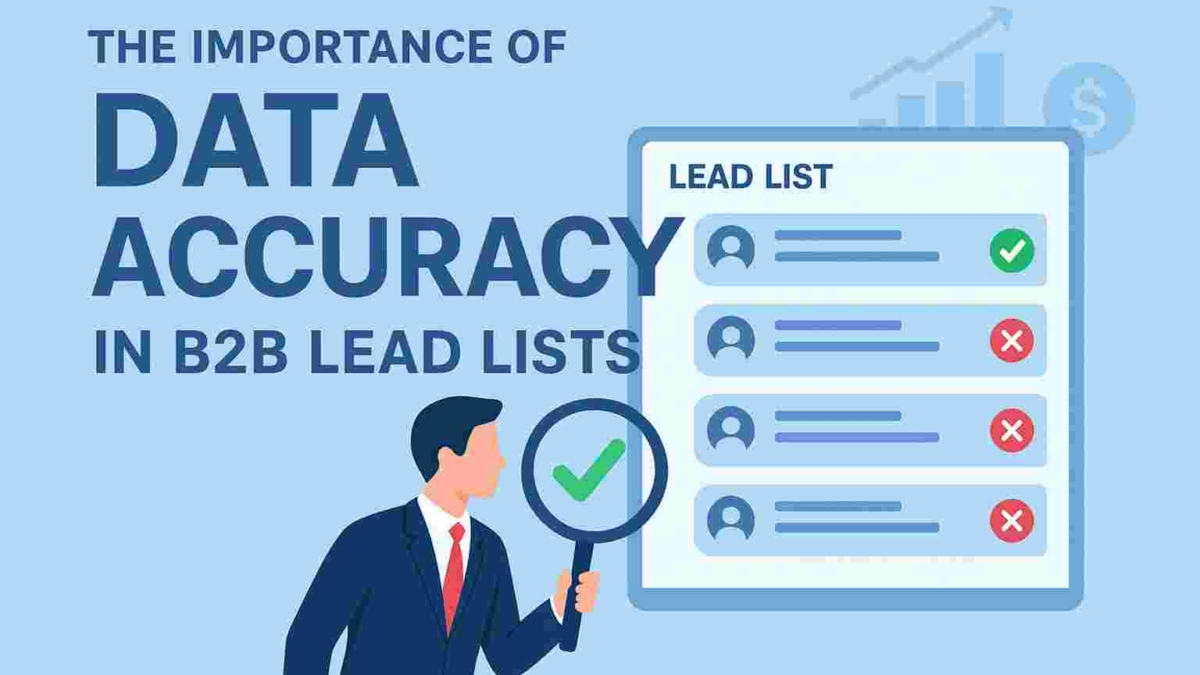Introduction
In the fast-paced world of B2B sales, accurate data is the fuel that powers success. Imagine a sales team dialing outdated numbers or sending emails to inactive accounts—it’s like trying to fill a bucket with holes. The importance of data accuracy in B2B lead lists cannot be overstated. When your data is flawed, your sales and marketing efforts suffer, costing you valuable time and money.
What Are B2B Lead Lists?
At its core, a B2B lead list is a collection of potential customer information—names, job titles, email addresses, phone numbers, and company details. These lists are the foundation of outreach campaigns, helping businesses identify and connect with decision-makers.
Without accurate data, even the most well-planned campaign falls flat. Think of it as using a broken compass on a long journey—you’ll waste resources but never reach your destination.
The Impact of Inaccurate Data
Bad data is more than just a nuisance—it’s a profit killer. Sales teams spend hours chasing dead leads, while marketing budgets shrink under wasted ad spend. Worse, when prospects receive irrelevant messages, it reflects poorly on your brand.
Some common effects of inaccurate data include:
- Sales teams wasting hours on unqualified contacts
- Higher email bounce rates and spam complaints
- Inflated campaign costs with little to no return
How Data Inaccuracy Creeps In
Data decay is natural, especially in B2B, where job roles change frequently. A prospect who was a marketing manager last month may have already switched companies today.
Other causes include:
- Human error: Mistyped names, wrong phone digits
- Outdated records: Employees switching companies or titles
- Low-quality purchased lists: Providers selling bulk data without verification
Consequences of Bad Data in B2B
Every inaccurate record has a ripple effect. Not only does it slow down the sales process, but it also damages credibility. Imagine addressing a prospect by the wrong name—it immediately kills trust.
Consequences include:
- Missed revenue opportunities
- Wasted ad spend on irrelevant audiences
- Poor sender reputation in email marketing
Why Data Accuracy Equals Higher ROI
The math is simple: accurate data = better targeting. When your team speaks to the right people, conversions go up, and costs go down. Verified lead lists ensure every call and email counts, boosting ROI significantly.
Verification Processes for Data Accuracy
There are multiple ways businesses can verify data:
- Manual checks: Time-consuming but useful for small datasets
- Automated verification tools: Software that validates emails, phone numbers, and company details
- Trusted providers: Services like ZoomInfoList that deliver pre-verified, high-quality leads
The Role of CRM Systems in Data Accuracy
CRM systems act as the central hub for all customer information. When integrated with verification tools, CRMs can automatically detect duplicates, flag outdated entries, and help sales teams stay on top of fresh, clean data.
Best Practices for Maintaining Accurate Lead Lists
Keeping your data accurate isn’t a one-time task—it’s an ongoing process. Some best practices include:
- Scheduling regular database audits
- Using enrichment tools to add missing details
- Continuously monitoring data health
Real-World Example: The Cost of Inaccuracy
Let’s say your sales team works with a list of 5,000 contacts. If 20% of that data is inaccurate, that’s 1,000 wasted calls and emails. Compare that to a verified list where every lead is current—you instantly save time and increase chances of conversion.
Benefits of Investing in Data Accuracy
When businesses invest in accurate lead data, they gain:
- Better personalization and engagement
- Higher sales productivity
- Stronger client relationships built on trust
The Role of Artificial Intelligence in Data Verification
AI is transforming data verification by spotting duplicates, predicting outdated records, and even suggesting new leads. With predictive analytics, businesses can target prospects who are more likely to convert.
Future of B2B Lead Data Accuracy
As businesses go digital-first, data accuracy will become even more important. Companies relying on old, inaccurate lists will fall behind, while those investing in real-time verification will thrive.
Choosing the Right Data Provider
Not all lead list providers are equal. When choosing one, consider accuracy rates, verification processes, and customer reviews. Platforms like ZoomInfoList specialize in delivering verified, up-to-date B2B leads that save businesses both time and money.
Conclusion
Data accuracy is the lifeline of B2B lead generation. Inaccurate data drains resources, kills trust, and lowers ROI. On the flip side, clean, verified lead lists give businesses the power to scale efficiently, convert faster, and grow sustainably.
FAQs
1. Why is data accuracy critical in B2B lead generation?
Because accurate data ensures you’re targeting real, relevant decision-makers, which increases conversion rates and ROI.
2. How often should businesses verify their lead lists?
Ideally every 3–6 months, since job roles and company details change frequently.
3. Can inaccurate data harm a company’s reputation?
Yes. Sending irrelevant or incorrect messages damages credibility and trust with prospects.
4. What tools help improve data accuracy?
Email verification tools, CRM systems, and trusted providers like ZoomInfoList.
5. Is outsourcing lead list verification a good option?
Absolutely. Outsourcing saves time and ensures higher-quality data through expert verification processes.


Leave a comment